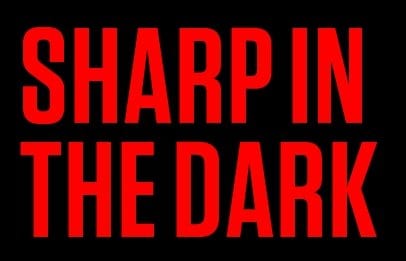Two stacks of four-inch-square sheets of white paper stood, side-by-side, in a black, plastic tray on Sharp’s desk. Each stack had two holes drilled in it, and the stacks were attached by two, upside-down, U-shaped metal rods. The stack on the left was thicker than the other — and its sheets were blank. Using her good hand, Sharp lifted the top piece of paper on the right — which had a large “23” typeset on it — up and over the two rods, until it lay upside-down on the larger, left side stack.
The top of the right stack now read “24.” Above, in smaller print, was the word “October,” and below, the number “1984.”
A newspaper lay on the desk, too, bearing the same date. Sharp opened the paper to the local news section and quickly found what she was looking for. The headline read: “East End Burglar adds murder to CV; Police at loss.”
Sharp’s forehead knitted together as she scanned the article. “…The investigation enters its second week and police appear to be no closer to solving the identity of the so-called East End Burglar — now turned murderer. Detective Kevin Lee, who is leading the investigation, put a brave face on matters telling reporters that the police believe Claire Iverson’s murder was the result of a botched burglary, and that the East End Burglar is their prime suspect. Sharp turned the page and continued to read. “We’re reviewing all three cases, canvassing the neighbourhood where the break-ins took place and looking through all the evidence collected to date. We will not rest until we have the perpetrator of these crimes behind bars and our streets are safe once again,” Detective Lee said to a packed press conference Wednesday afternoon.
Sharp sat back in her chair and closed her eyes. All three cases, she thought to herself and let the words sink in.
Suddenly, she leapt out of her chair, grabbed her jacket, and left the office.
On her desk, a file folder stuck out from under the newspaper. It was labelled “Mintz,” and the word, “Call!” was scrawled across it.
*
Sharp backed into a parking space on Parliament Street. She climbed out of the car and walked to the parking meter while she scrounged in her jacket pockets. She inserted a quarter into the slot, turned the knob 90 degrees and let it go. The needle shot to one hour.
Should be enough time, Sharp thought as she walked toward the entrance to the public library.
Inside, she found the periodicals section and began sorting slowly, with her good hand, through stacks of newspapers. She selected every paper from the previous two weeks and plunked them down on a wooden table nearby. An elderly man with thin, white hair combed carefully across his wide, freckled forehead was reading the comics at the same table. He exhaled sharply and suddenly through his nose as each punchline registered.
Sharp opened up the oldest of the newspapers and flipped to the Local News section. She scanned each page, then closed the paper, and opened the next day’s. She went through three papers before she found a small article on page 8, with the headline, “Break-In Shocks Resident.” She scratched down the name of the resident, one Paul Carol of Donald Road, and the date, and then moved on to the next day’s paper.
A librarian pushed a cart of books past Sharp. She paused — more like hesitated — then blurted out, “Are you finding everything you’re looking for?” She was about 22 and dressed in a pink blouse and dark, form-fitting slacks. She pushed a lock of light brown hair behind her ear.
Sharp looked up, confused for a second. “Huh? Oh, yes, thanks,” she said, smiling. The librarian smiled back.
“Well, just let me know if you need anything. Anything at all.” She wheeled her cart forward, deep into the Periodicals section, and began collecting abandoned magazines, newspapers and books for reshelving.
Sharp thought for a moment, then stood up and walked towards her. “Excuse me. Actually, I do have a question.”
“Oh?” She turned, her face flushing.
“Do you keep Toronto telephone books?”
“Yes, yes we do. Here, let me show you where they are.”
Sharp grabbed her notebook and followed the librarian into the Reference section.
“What year are you looking for?” she said, over her shoulder.
“The latest you have,” Sharp said as they entered a shelved alcove lined with sagging, worn phone books. The librarian bent down, lifted a phone book off the bottom shelf, and placed it on a nearby table.
“Thanks, that’s perfect,” Sharp said, opening it up to the Cs.
“What are you researching? If you don’t mind my asking,” she said, peering at Sharp’s scrawled page of notes.
“Murder,” Sharp smiled up at the librarian, then returned to the column of names. She held her bandaged hand up against her chest. The frayed, cloth edge of the dressing brushed against her chin.
“Oh? Oh, I see.” The librarian stepped away from Sharp, her smile vanishing. A chalky, gray colour spread across her cheeks. She licked her suddenly dry lips. “Well, then, I suppose I’ll leave you to it.” She turned suddenly, banged her shoulder into the steel corner of the shelves, and cried out.
“Huh? Are you all right?” Sharp looked up, surprised.
“Fine! Fine, just fine,” she said, rubbing her shoulder and walking quickly away.
Sharp frowned, then returned to her list of names and telephone numbers. Her finger stopped near the bottom of the last column of Cs. Carol, P. 97 Donald Road. Sharp wrote down the address and phone number in her notebook, then hoisted the telephone book up in her arm and headed back to her pile of newspapers.
*
About an hour later, Sharp was driving north on Yonge Street, the main north-south artery in the city. The K-car drove past head shops, army surplus outfitters, discount shoe stores, including one’s whose inventory included high heels for women and men with big feet, and hung a right onto Donald Road, a leafy, narrow street that led straight to Church Street and the gay neighbourhood.
Sharp took the first parking spot she saw and started walking. She clocked number 97 on the opposite side of the street, behind a birch tree that had already lost all its leaves. It was a narrow Victorian jammed between two others, and divided into apartments. Sharp stepped onto the wooden front porch, which was littered with dead leaves and other debris that had blown over from Yonge Street.
She eyed the buzzer. P. Carol had the first floor apartment. She pressed and waited. Nothing. She peered into the front bay window but the drapes were drawn and the place was in darkness. I’ll come back tonight. He’s probably at work, she thought, and then gave the buzzer one more hard, sustained press.
Just then the wooden front door pulled open at the same time that a man’s voice was saying, “Well, you don’t have to wear down the battery.”
He peered at Sharp through thick, gold-rimmed designer glasses. She guessed he was in his mid-thirties. He was wearing a white turtle neck under a v-necked, tan-coloured sweater, and a white belt and tight jeans. His clothes were neat and the look was finished with a heavy douse of men’s cologne. Sharp pegged him for gay. No big surprise. It was the neighbourhood, after all.
“Well, what do you want?” he eyed her suspiciously.
“I’m investigating the robbery that took place here, and I wondered if I could ask you a few questions,” Sharp smiled, wishing her hand wasn’t wrapped in a bandage and held up like a trophy in front of her.
“I’m done with answering questions. Sorry kiddo,” he pulled the door shut.
“Hang on,” Sharp stuck her foot in the doorway. “Look — I’m a private investigator. I work in the–community, you know? I really want to solve this case–before the police. And I could use your help,” she said, sincerely.
He tilted his head to the side, considered for a moment, then said, “Oh… Intriguing! So you’re working the margins, so to speak,” he wriggled his shoulders, delighted. “Why didn’t you say so? Come on in. The place is a disaster. Consider yourself warned,” he said as he disappeared into his apartment, leaving Sharp to shut and lock the front door and chase after him.
After shoving aside stacks of men’s health and fitness magazines, Sharp got herself settled on the couch. He sat across from her in a blue leather chair.
“Nice chair,” she said, admiringly.
“I got it back from the upholsterer yesterday. It cost me a small fortune but what a throne, huh?” He stroked the arms, grinning.
“I love the colour, too.”
“So? What do you want to know?” he said, suddenly tired of the chair topic.
Sharp opened her notebook. “Okay, so, your apartment was broken into in the early hours of October 16, is that correct?” she looked up.
“Yes. Here’s what happened,” he said, taking charge. “I had come in from Pals — the bar. I’m sure you know it,” he waved a hand at Sharp and continued. “There was an amazing drag show that night. Anyway, I arrived home alone — yes, it’s true — at about a quarter after one. After an hour or so, I went to bed. Then, at about three-thirty, I hear a thud. I’m on the first floor and I am very aware of crime–I mean, we do get break-ins in this neighbourhood, though I myself have never had one until now. But it’s on your mind, you see what I mean? Anyway, I hear this thud and I’m pretty sure that’s what happening.” He recrossed his leg and kept going. “Honestly, I was terrified. Then for the longest time, there was no sound, so I finally got up and looked around. Now it’s cold, too, which is strange because the landlord keeps the heat way up. Well, guess what? The window in the kitchen had the glass taken right out of it! He’d been and gone. So I called the police and the rest is history.” he rolled his eyes and grimaced.
“That must have been frightening.”
“It was, honey, believe me.”
Sharp nodded, thinking, then rubbed the side of her nose with her bandaged hand — then recoiled in surprise.
“Don’t hurt yourself … again!” He laughed at her, then added, “Say, what happened to you, anyway?”
“Accident with a nail.”
“Ouch.”
Sharp tapped her pencil against the page in her book titled Carol, P. 97 Donald Road. “What was taken from your apartment?”
Paul Carol did an over-sized shrug, then said, “Besides my sense of security? The usual things–my television and stereo receiver.”
“Right,” Sharp sighed as she made a note of the stolen items. At the same time, an overwhelming sense that she was getting nowhere took hold of her. This is crazy. What am I doing here? This is Lee’s case, not mine, Sharp thought to herself as she closed her note book and thanked Paul Carol for his time.
“Anytime,” he said as he followed her to the door. Then he added, “But you know what’s the damnedest thing?”
Sharp turned back to him.
“They aren’t worth a thing.”
“What’s not worth a thing?”
“The stuff the guy took. The television hardly works, unless you spend 10 minutes wiggling the wires on top of it — and even then all you get is hockey and the receiver’s from 1975 and it was cheap when it was new,” he said shaking his head, then added: “All I can guess is that the guy’s into junk.”


 Why you can trust Xtra
Why you can trust Xtra


